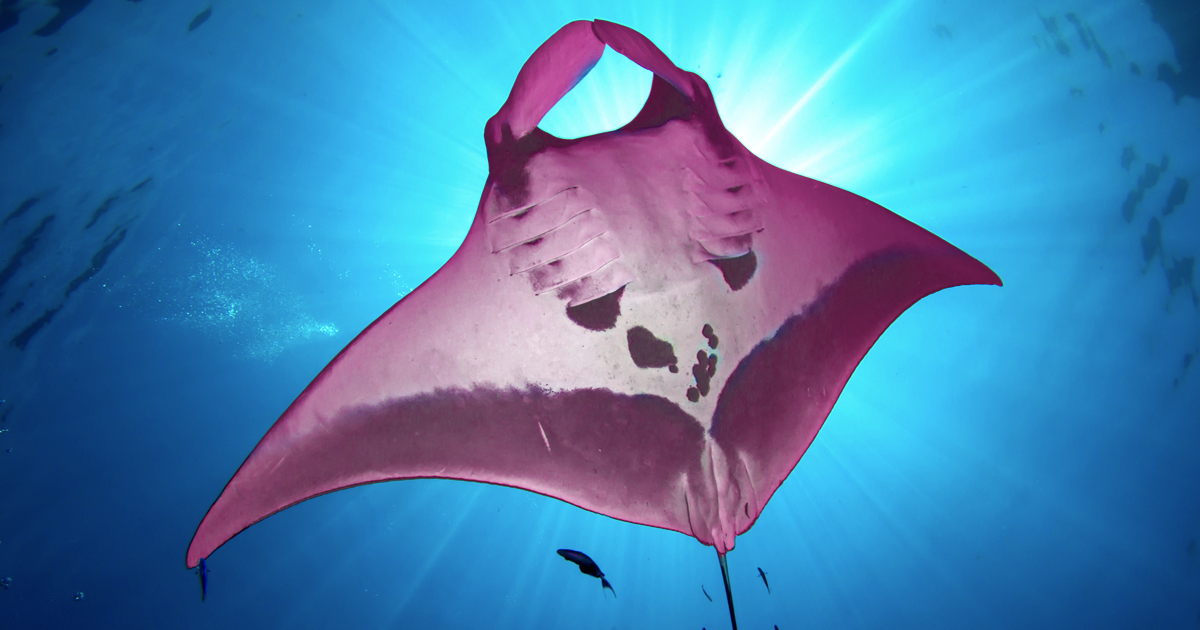A truly wondrous natural phenomenon has been captured in photo. The world’s only known pink manta ray. In the aquatic world, even grown fish sometimes retain the magnificent colors nature bestows on them at birth. Clown fish, for example, are beautifully hued creatures that keep their rainbow colors for their entire lives, but larger fish — manta rays, for example — are a dull, rather uninspiring shade of grey, or even a dull brownish green.
Vivid colors like aquamarine and bright pink aren’t found on large sea critters; it’s as though nature gave them size, and decided that was enough of an advantage, since they can pretty much take on any adversary they encounter under the sea. But all of that changes now with the discovery of this pretty in pink manta ray.
Photographer Captures Beautiful Photos of the World’s Only Known Pink Manta Ray #natgeo While diving off the coast of Australia, Laine captured several photos of the world’s only known pink manta ray—literally a one-of-a-kind photo opportunity. #pinkmantaray pic.twitter.com/0X3rpyAtED
— poorni (@poornima007j) March 6, 2020
Imagine the shock photographer Kristian Laine got last month when he was diving off Lady Elliot Island in the Great Barrier Reef, in Australia. He encountered a one-of-a-kind pink, male manta ray, and was so surprised he very nearly didn’t get photographs of it. At first, Laine thought either his eyesight or his camera was playing tricks on him, but once he looked for a few long moments, he realized that yes, he was face to face with a startling, pink manta ray. And he’s got the pictures to prove it.
Formally called a pink reef manta, the oddball creature was first spotted five years ago, by diving instructor Ryan Jeffrey, who also got pictures. It is such an anomaly in nature that the ray earned his own name, Inspector Clouseau, after the famous, clumsy detective in the “Pink Panther” movie series, with Peter Sellers. But he has warranted some serious investigation, too, because marine biologists aren’t sure what has caused the colourizing of his skin. He is very timid and retiring, and though he’s been spotted about 10 times since Jeffrey’s initial sighting, he is elusive when researchers try to get too close.
Nonetheless, Project Manta, an organization devoted to studying manta rays in Australia, has had a chance to see Inspector Clouseau, and even got a skin sample to biopsy in 2016. According to ecologist Asia Haines, who is with the group, the pink manta ray is a tough case to examine. She recently told sciencealert.com, “There has not been a thorough investigation into diet or stable isotope analysis,” she explained, “but given the stability of the white ‘birthmark’ and pink colouring over time we think diet can be ruled out. The working theory is that it is just a different, very unique expression of the melanin, (in his skin) but that is still to be confirmed.”
https://www.youtube.com/watch?v=1UmLjMe6brA
Whatever the reason Clouseau is the dusty rose shade he is, Laine is just glad to be one of the few who’ve seen him up close. “Overall,” he told sciencealert.com, “it was just very calm and let me be there. Later, when I realized what I had witnessed I was stoked — I just couldn’t believe how rare a moment I had experienced.”
Related Article: Prehistoric Giant Rat the Size of a Human Discovered in Brazil
Indeed, just being close to a massive creature like Clouseau would be memorable — he’s more than 11 feet long. But seeing the pink that Mother Nature has bestowed upon Clouseau would take that memory to the next level — from enjoyment to amazement to wonder. It’s the kind of experience the Great Barrier Reef is famous for, and now this pink manta ray is every bit as famous, too.
